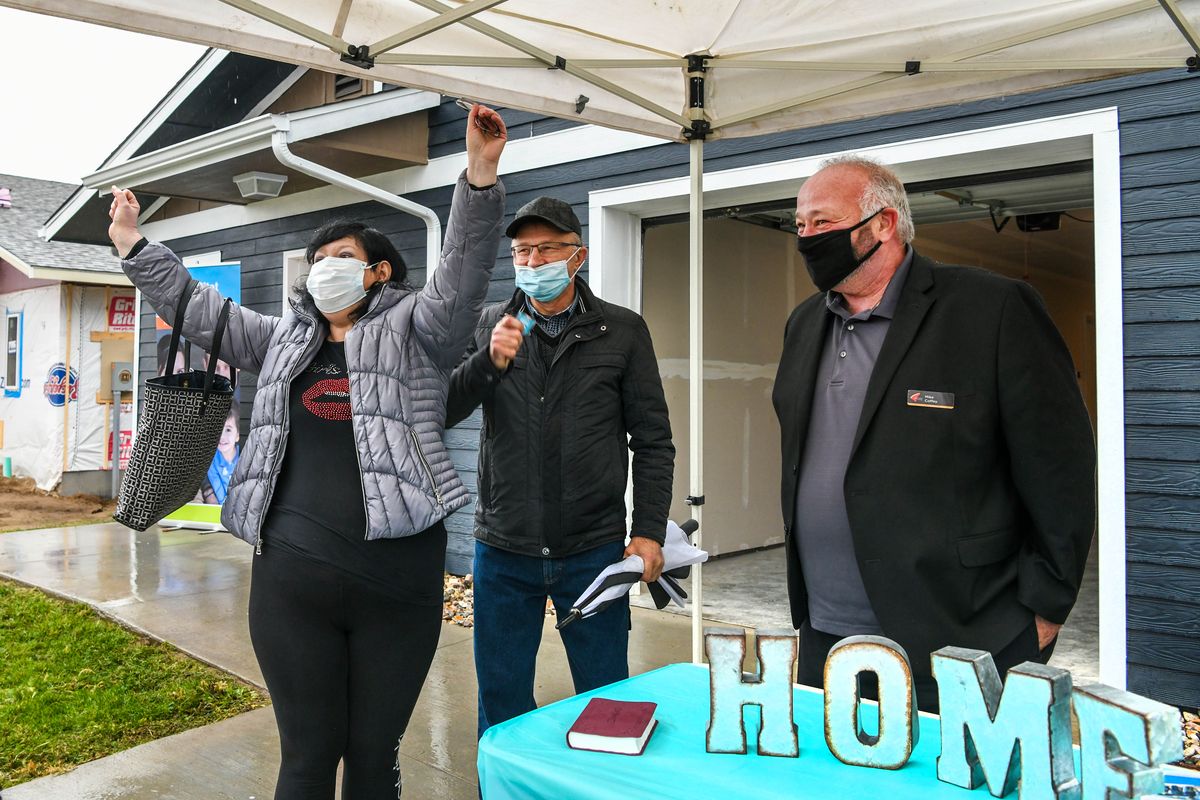Welcome to Hope Meadows: Amid Spokane County’s frenzied housing market, Habitat for Humanity continues to build affordable homes

DEER PARK – Buying a home in Spokane is too expensive for Sofya and Evgeny Yaitskiy.
The two, who moved to the area two and a half years ago, are Russian immigrants who fall into a lower income bracket and were unable to obtain traditional homebuyer loans. While attending an English as a Second Language Class, they were referred to Habitat for Humanity-Spokane’s homeownership program – initially thinking it a scam, Sofya Yaitskiy said.
More than a year after their application was approved last June, the Yaitskiys are set to move into their new home in Deer Park.
“This home, it’s not only walls, it’s not only (a) roof and windows,” Sofya Yaitskiy said, “it’s a place where you want to come back again and again and a place where you’re going to have happiness.”
The Yaitskiy home is the newest addition to Habitat for Humanity-Spokane’s Hope Meadows housing community, which started construction in 2011. To date, 51 homes have been completed in Hope Meadows.
The Yaitskiys and their neighbors in the twin home, Alex and Jessica Levins, were each given their house keys Friday during a dedication ceremony attended by many of the volunteers who helped build the homes in Hope Meadows.
Michelle Girardot, CEO of the Spokane organization, said Habitat has around 14 more homes to build in Hope Meadows before the neighborhood is complete.
The organization also has a minimum of 50 housing units planned for a development called Highland Village in Airway Heights. Girardot said four units are done, with another eight slated for completion by January.
Friday’s home dedication ceremony was the first Habitat for Humanity-Spokane has done in-person in more than a year due to the COVID-19 pandemic.
Construction of homes in Hope Meadows has been complicated by the pandemic, from situations such as increased material costs and labor shortages, Girardot said. Habitat homes are largely built by volunteers.
“It’s been really fascinating. In a time it would (typically) take us maybe four to five months to complete twin homes, it took us seven or eight,” she said. “When you depend so much on volunteers and you can’t safely volunteer, it obviously makes things take a lot longer.”
Meanwhile, Girardot said Habitat for Humanity-Spokane has more than 50 families still completing their partnership requirements with the homeownership program. Another 170 families are on a waiting list to begin their partnership requirements once Habitat-Spokane finds them a space to live.
In order to qualify for the homeownership program, families must make less than 80% of the area’s median income, attend homebuyer classes and must contribute at least 250 hours in “sweat equity,” which involves helping to build their homes, as well as their neighbors’.
Overall, Girardot said Habitat has seen a 300% increase in qualified family applicants since last March.
“The partnership is not an overnight process,” she said. “It takes about a year, minimum, to go through the entire program.”
Across Habitat for Humanity-Spokane’s service area in Spokane County, the record-high cost of home construction has compounded the issues related to the COVID-19 pandemic.
Girardot said Habitat doesn’t want to sell below market value, as that might have larger implications on housing costs of a particular community. Selling at market value, however, would likely price out their applicants to the homeownership program, which is built on a tenet of affordability.
As such, Girardot said Habitat-Spokane has a few homes in Spokane where the organization has taken the cost of the land out of the mortgage, instead tying the properties to a ground lease. The land, then, is put into a trust with Habitat for Humanity-Spokane, where Girardot said it will remain for at least 99 years.
“In neighborhoods that are experiencing gentrification … those homes will be permanently affordable homeownership housing stock in those neighborhoods,” Girardot said. “So when that family decides to sell, they will get enough equity for a nice down payment on the next home, and then another family that was in the same circumstances that they were initially will have an option to become homeowners themselves.”
The homes in Hope Meadows fall under more traditional ownership structures.
“We found that the homes that we were rehabbing within the City of Spokane were appraising for way higher than what these families could afford,” Girardot said. “We’re testing this ground-lease theory with our first rehabs in Spokane. It may very well be a program that we extend to all of our construction activities.”